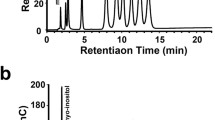Abstract
The present study investigated the mechanism of Japanese apricot extract (JAE) in inhibiting lung cancer cells proliferation. JAE inhibited A549 lung cancer cell proliferation at non-cytotoxic doses and suppressed nuclear factor-κB (NF-κB) activation induced by TNF-α at a dose of 1 mg/mL (p<0.05). Proteasome activities of A549 cells were blocked by JAE in a dose-dependent manner at concentrations of 0.67 and 1 mg/mL (p<0.05). These results indicate that JAE has anti-proliferative activity against A549 cells and suppresses NF-κB activation, partially due to inhibiting proteasome activity.
Similar content being viewed by others
References
Block G, Patterson B, Subar A. Fruit, vegetables, and cancer prevention: A review of the epidemiological evidence. Nutr. Cancer 18: 1–29 (1992)
Dias AS, Porawski M, Alonso M, Marroni N, Collado PS, Gonzalez-Gallego J. Quercetin decreases oxidative stress, NF-κB activation, and iNOS overexpression in liver of streptozotocininduced diabetic rats. J. Nutr. 135: 2299–2304 (2005)
Aggarwal S, Ichikawa H, Takada Y, Sandur SK, Shishodia S, Aggarwal BB. Curcumin (diferuloylmethane) down-regulates expression of cell proliferation and antiapoptotic and metastatic gene products through suppression of IκBα kinase and Akt activation. Mol. Pharmacol. 69: 195–206 (2006)
Bours V, Bentires-Alj M, Hellin A, Viatour P, Robe P, Delhalle S, Benoit V, Merville M. Nuclear factor-κB, cancer, and apoptosis. Biochem. Pharmacol. 60: 1085–1090 (2000)
Van Waes C. Nuclear factor-κB in development, prevention, and therapy of cancer. Clin. Cancer Res. 13: 1076–1082 (2007)
Nakagawa A, Sawada T, Okada T, Ohsawa T, Adachi M, Kubota K. New antineoplastic agent, MK615, from UME (a variety of) Japanese apricot inhibits growth of breast cancer cells in vitro. Breast J. 13: 44–49 (2007)
Mori S, Sawada T, Okada T, Ohsawa T, Adachi M, Kuboa K. New anti-proliferative agent, MK615, from Japanese apricot’ Prunus mume’ induces striking autophagy in colon cancer cells in vitro. World J. Gastroenterol. 13: 6512–6517 (2007)
Okada T, Sawada T, Osawa T, Adachi M, Kubota K. MK615 inhibits pancreatic cancer cell growth by dual inhibition of Aurora A and B kinases. World J. Gastroenterol. 14: 1378–1382 (2008)
Wolfe K, Wu X, Liu RH. Antioxidant activity of apple peels. J. Agr. Food Chem. 51: 609–614 (2003)
Yoon H, Liu RH. Effect of selected phytochemicals and apple extracts on NF-κB activation in human breast cancer MCF-7 cells. J. Agr. Food Chem. 55: 3167–3173 (2007)
Liu RH, Jacob J, Tennant B. Chemiluminescent detection of protein molecular weight markers in Western blot techniques. Biotechniques 22: 594–595 (1997)
Place RF, Noonan EJ, Giardina C. HDAC inhibition prevents NF-κB activation by suppressing proteasome activity: Down-regulation of proteasome subunit expression stabilizes IκBα. Biochem. Pharmacol. 70: 393–406 (2001)
Nam S, Smith DM, Dou QP. Ester bond-containing tea polyphenols potently inhibit proteasome activity in vitro and in vivo. J. Biol. Chem. 276: 13322–13330 (2001)
Yang H, Chen D, Cui QC, Yuan X, Dou QP. Celastrol, a triterpene extracted from the Chinese ‘thunder of god vine’, is a potent proteasome inhibitor and suppresses human prostate cancer growth in nude mice. Cancer Res. 66: 4758–4765 (2006)
Yamai H, Sawada N, Yoshida Y, Seike J, Takizawa H, Kenzaki K, Miyoshi T, Kondo K, Bando Y, Ohnishi Y, Tangoku A. Triterpenes augment the inhibitory effects of anticancer drugs on growth of human esophageal carcinoma cells in vitro and suppress experimental metastasis in vivo. Int. J. Cancer 125: 952–960 (2009)
Author information
Authors and Affiliations
Corresponding author
Rights and permissions
About this article
Cite this article
Yoon, H. Japanese apricot extract attenuates nuclear factor-κB activation and proteasomal activity in A549 lung cancer cells. Food Sci Biotechnol 21, 1507–1510 (2012). https://doi.org/10.1007/s10068-012-0200-4
Received:
Revised:
Accepted:
Published:
Issue Date:
DOI: https://doi.org/10.1007/s10068-012-0200-4




